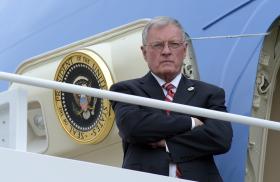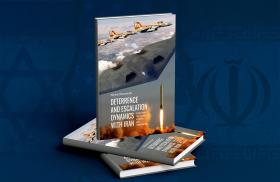
- Policy Analysis
- Policy Alert
When the UAE Says “No” to Israeli Annexation, What Does It Mean?

Washington should urgently heed Abu Dhabi’s warning—not only because it comes from such a close U.S.-Israeli partner, but also because of the major regional fallout it heralds if unilateral annexations proceed in the West Bank.
In a September 2 interview, Emirati Special Envoy Lana Nusseibeh warned that any unilateral Israeli annexations in the West Bank are a “red line” that would “foreclose the idea of regional integration.” Coming from the United Arab Emirates, one of Israel’s closest partners in the Arab world, the warning demonstrates both the toll that the Gaza war has exacted on regional diplomacy and the degree to which partners believe annexation could affect the feasibility of a future two-state solution with the Palestinians. It is also a stark warning that one of the Trump administration’s top Middle East objectives—increasing Arab-Israel regional integration—is under severe stress. Without immediate U.S. intervention, even the Abraham Accords themselves could be at risk.
A Summer Shift?
For much of the Gaza war, UAE public statements on the crisis were relatively quiet compared to the heightened rhetoric issued by other Arab states. Instead, Abu Dhabi tended to address disagreements with Israel privately while taking steps to ensure it could continue alleviating the humanitarian situation in Gaza and exploring postwar scenarios for the devastated Strip.
In recent weeks, however, Emirati frustrations began surfacing publicly. On August 5, Abu Dhabi harshly condemned Israeli National Security Minister Itamar Ben-Gvir for “storming” al-Aqsa Mosque, then summoned the Israeli ambassador a few days later to lodge a formal protest against “disgraceful and provocative violations” during Jerusalem Day. Such statements are ordinary for other Arab states that have relations with Israel, but they raise serious alarm coming from the UAE and indicate the depth of its exasperation that quiet diplomacy is not producing results.
Annexation remains a particularly significant issue for the UAE because preventing it was one of the government’s preconditions for signing onto the Abraham Accords in 2020. At the time, Israel committed not to pursue annexation for a set number of years, and although that grace period has formally expired, Abu Dhabi would still have to pay an enormous political cost at home and throughout the Arab world if Israel proceeds with any such moves.
Far-Reaching Regional Implications
Besides the obvious negative economic and diplomatic consequences for Israel and the UAE, the erosion of their relationship would have wider regional effects. Just as Abu Dhabi’s historic decision to enter formal relations with Israel five years ago paved the way for other Arab states to do the same, a breakdown in those relations would affect how other Arab states engage Israel. Most immediately, other signatories to the Abraham Accords would likely suspend their participation in that agreement if the UAE does so. Moreover, Egypt and Jordan have already warned Jerusalem about the bilateral consequences of annexation and could even reconsider their peace treaties with Israel.
An Emirati-Israeli breakdown would also be a boon for regional extremists who have long opposed Arab-Israeli peace. Groups like the Muslim Brotherhood would no doubt use it to undermine governments that chose to normalize relations with Israel, potentially stoking instability. Annexation would empower Hamas as well, validating its argument that the Palestinian Authority’s diplomatic path was a misguided decision that gave Israel cover to seize territory in the West Bank, and enabling it to claim that only violence provides results. Indeed, given recent Israeli security warnings about growing volatility in the West Bank, many observers are concerned that talk of annexation and diplomatic rifts could spur wider violence.
For the United States, expanding the Abraham Accords and normalizing Israeli relations with Saudi Arabia have been repeatedly identified as a priority by the Trump administration. Although all parties tacitly acknowledge that making progress on this goal is unlikely while the Gaza war persists, Washington still hopes to leverage the war’s end to relaunch that effort. Yet annexations in the West Bank would make Saudi normalization unachievable regardless of a Gaza resolution. Riyadh has long stated that it will not open formal relations with Israel unless it at minimum preserves a pathway to a Palestinian state—a goal that is fundamentally incompatible with annexation.
Recommendations
Given the severity of these potential consequences, the Trump administration should urgently press Israel to shelve any plans for West Bank annexation, just as it did during the president’s first term in the lead-up to the Abraham Accords. These developments also highlight the need for greater U.S. attention to the West Bank and the wider Israeli-Palestinian conflict. To date, the administration has understandably focused on the Gaza war given its devastating human toll and destabilizing regional impact. Yet the UAE’s warnings about annexation, the Saudi-French push for international recognition of a Palestinian state, and the increasingly negative effects of Israeli policies in the West Bank show that these issues cannot be sidelined any longer. If Washington does not take action, the diplomatic vacuum will be filled by other actors who do not necessarily share U.S. views.
Specifically, the Trump administration needs to articulate a policy on the wider Israeli-Palestinian conflict. In operational terms, this entails building a team of officials to maintain focus on these issues, engaging various regional and international actors to become involved in a productive fashion, and doing the necessary follow-up work to implement the new U.S. policy.
Ghaith al-Omari is the Gilbert Foundation Senior Fellow at The Washington Institute and a former advisor to the Palestinian Authority. Neomi Neumann is an adjunct fellow with the Institute and former head of the research unit at the Israel Security Agency.



